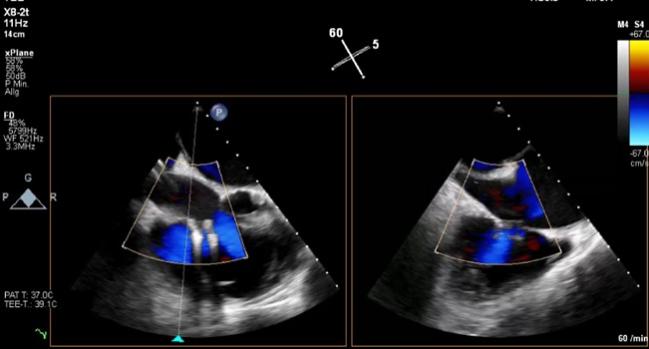CMS Agrees to Reimburse Tricuspid TEER
The overall evidence for the procedure is “insufficient” at present, but good enough to allow coverage, the agency says.

Photo Credit: Adapted from Ruf, TF. Case presentations: T-TEER basic and complex. Presented at: TCT 2023. San Francisco, CA.
The US Centers for Medicare & Medicaid Services (CMS) has finalized its reimbursement decision for the use of tricuspid transcatheter edge-to-edge repair (T-TEER) to treat patients with symptomatic tricuspid regurgitation (TR).
The procedure will be paid for by CMS when it involves a US Food and Drug Administration-approved device used for an authorized indication in patients who remain symptomatic despite the use of optimal medical therapy, according to the national coverage determination (NCD) released last week.
Patients also must be deemed appropriate for tricuspid valve repair by a heart team that includes, at a minimum, a cardiac surgeon, an interventional cardiologist, a heart failure specialist, and an interventional echocardiographer. All these physicians are required to have experience in managing patients with TR.
CMS had proposed including an electrophysiologist and multimodality imaging specialists as essential components of the heart team but dropped them in response to public comments.
“Several commenters stated that an electrophysiologist can be consulted if needed but should not be required on the heart team,” CMS said, adding that there were concerns the requirement “could increase burden and delays and limit access to T-TEER.” In response, the agency said it agrees “that consultation with an electrophysiologist may be appropriate in specific cases but should not be required for every procedure.”
The condition for multimodality imaging specialists was removed in recognition of the fact that echocardiography is the main imaging modality used during T-TEER. “The final physician criteria allows flexibility for heart teams to consult other multimodality imaging specialists based on the imaging modalities that are clinically appropriate for each patient,” CMS said.
As with transcatheter tricuspid valve replacement, which received coverage earlier this year, T-TEER will be reimbursable only through the coverage with evidence development (CED) process, which requires procedures to be performed in the context of a CMS-approved study. The requirements for such a study are laid out in the NCD and will include a focus on clinically meaningful endpoints.
Concerns About Available Data
The agency agreed to cover T-TEER based on evidence from the TRILUMINATE single-arm trial, the TRILUMINATE Pivotal trial, and the Tri.Fr trial, which all evaluated the TriClip device (Abbott). It also reviewed additional evidence coming from several registry studies of TriClip.
One criticism of the TRILUMINATE data has been that the positive results were driven by improvements in quality of life and not reductions in hard clinical outcomes, like mortality. However, the 2-year results of the pivotal trial, reported earlier this year, did reveal a lower risk of hospitalizations for heart failure with T-TEER versus medical therapy alone.
Some commenters who submitted responses to the CMS proposal pointed to the lack of “clinically meaningful benefit and noted they were concerned that the TRILUMINATE Pivotal trial did not show a decrease in mortality, tricuspid valve surgeries, or overall hospitalizations with T-TEER compared to medical therapy,” the agency said. “They also expressed concern over the rates of adverse events, the rate of crossover from the medical therapy group to the T-TEER group, and potential placebo effects due to unblinding.”
CMS acknowledged these concerns. “While we agree that there are evidence gaps that still need to be addressed regarding T-TEER, we believe the evidence overall, while insufficient, is promising enough to allow coverage with evidence development,” it said. “The primary outcomes described in the CED criteria are all-cause mortality and hospitalizations through a minimum of 24 months. The final NCD includes CED study criteria that strike the appropriate balance between evidence generation and patient access.”
Todd Neale is the Associate News Editor for TCTMD and a Senior Medical Journalist. He got his start in journalism at …
Read Full BioSources
US Centers for Medicare & Medicaid Services. Transcatheter edge-to-edge repair for tricuspid valve regurgitation (T-TEER). Published on: July 2, 2025. Accessed on July 7, 2025.





Comments